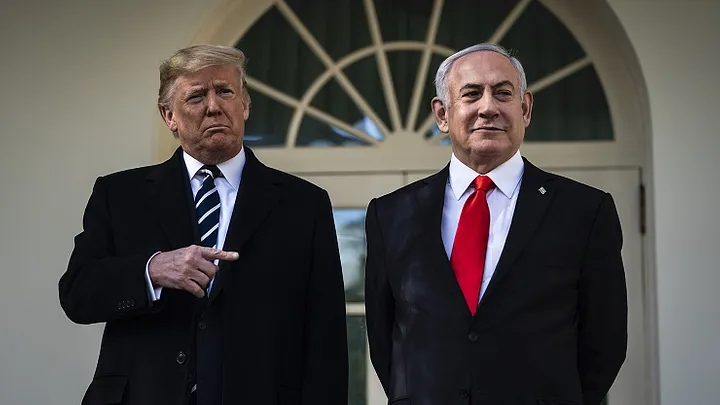
An “Unsettlement” Plan for the Middle East
Nobody had any expectation that a plan conceived by President Trump, midwifed by his Jewish son-in-law, Kushner and adopted by Israel and probably blessed by the Saudi Arabian strongman, MBS would create a breakthrough in resolving the conflict in West Asia. But it did worse than even the prophets of doom had predicted as its framework was a sharp departure from decades of American policy, not to speak of the international consensus. The United States has long voiced support for the creation of a Palestinian state with only slight adjustments to the Israeli boundaries that existed before the Arab-Israeli war of 1967. Even President Trump had endorsed the two nation theory and a division of Jerusalem to accommodate the two states. The plan, just unveiled, would have been a sure recipe for conflict, if Palestine had the kind of support it had before.
The 181-page Trump plan proposes a West Bank with interconnected pieces of Israeli territory containing settlements largely encircled by Palestinian lands. Palestinians, would have to give up their claim to large amounts of West Bank land, including places where Israel has built settlements over the past half-century and important areas along the Jordanian border. Most of the world, including the US, had opposed the illegal Israeli settlements in these areas.
The framework also sets aside the long- time goal of an independent Palestinian state. Instead, Trump vaguely promised that Palestinians could “achieve an independent state of their very own” but gave few details, while Netanyahu said the deal provided a “pathway to a Palestinian state” with significant caveats.
The plan rules out, for the first time, a fully independent Palestinian state, though the plan provides for a four-year window for them to engage in renewed settlement talks. During that time, Israel would refrain from constructing settlements in those parts of the West Bank that the plan has designated for Palestinians, not much of a concession on the part of Israel. The US has abandoned its earlier suggestion of uprooting tens of thousands of Israelis from the settlements to return those areas to the Palestinians for inclusion in their state. The Trump plan promises to leave both settlers and Palestinians in their current homes. Rather, it maps out a series of linked settlements and other areas that would officially become Israeli territory in the middle of the West Bank.
The plan also envisaged a Palestinian capital in “eastern Jerusalem,” on the outer edges of the city beyond Israel’s security barrier, while guaranteeing Israeli sovereignty over all of Jerusalem. This was “the most unkindest cut of all”, as Shakespeare would say. The city is a holy site for the Jewish, Muslim and Christian faiths and is not susceptible to concessions from any one of them even in the pursuit of land for peace.
Even more provocatively, Israel clarified that the proposed Palestinian capital would be in Abu Dis, a Palestinian village on the outskirts of the holy city. The plan proposes transportation links between the unconnected Palestinian territories in the West Bank and Gaza. The implicit US recognition of Israel’s claim to the Jordan Valley and all Jewish settlements in the West Bank is a major victory for Israel. The future US Presidents will not be able to alter this position.
The proposal virtually redrew the map of Israel to leave the West Bank portion of any potential Palestinian state surrounded on all sides by Israel. The largely condemned activities of Israeli strategy to expand its territory by annexing land and strengthening it with Jewish settlements have been legitimised.
The Palestinian leader said, “For too long, the very heart of the land of Israel where our patriots prayed, our prophets preached and our kings ruled has been outrageously branded as ‘illegally occupied territory,’” He added that Trump had punctured a big lie. Israel's prime minister called the plan the "opportunity of the century" and said he was willing to endorse it as the basis for negotiations with the Palestinians.
Trump’s sales talk that the deal was “a win-win opportunity” for both sides has had no effect on Palestinians and they have rejected it outright. Mahmoud Abbas, the leader of the Palestinian Authority condemned the plan calling it a “conspiracy” not worthy of serious consideration. “We say a thousand times over: no, no, no,” Abbas said, speaking from the West Bank. He also called it a “slap of the century”.
The Palestine Liberation Organisation (PLO) said the US plan "recognises Israel's illegal colonisation and annexation of occupied lands belonging to the State of Palestine,” while an Israeli human rights group said the truth that Palestinians would be "relegated to small, enclosed, isolated enclaves, with no control over their lives".
The international reaction to the plan was predictable. Most countries remained silent when they saw that the Plan was not likely to move forward. Days before leaving the European Union, Britain put itself at odds with its European allies in warmly welcoming the peace plan while France and the wider EU warned that it must respect international law.
The French Foreign Ministry welcomed the fact the Trump administration was putting forward ideas to resolve the conflict and said it would study the plan closely, but added that any agreement must “conform with international law”. The European Commission, said that the proposals needed to respect “all relevant U.N. resolutions and internationally agreed parameters”.
The French reference to international law is important given that Israeli government officials have interpreted Trump’s plan as giving them a green light to move quickly in applying Israeli sovereignty over nearly a third of the West Bank by formally annexing the territory to Israel.
MEA indirectly supported the plan by saying: "We urge the Parties to engage with each other, including on the recent proposals put forward by the United States, and find an acceptable two-State solution for peaceful coexistence." PM Modi went further and seemed to suggest that Palestine should accept the plan.
It is not unusual in diplomacy to put forward maximalist positions as an opening bid, with the possibility of negotiations to reach a compromise. But in such an exercise, there should be elements which the other side cannot resist so that it can make concessions on other issues to grab the offer. But there are no such elements in the plan and what it is seeking is a total surrender by the Palestinians. This means that Trump and Israel have no hope in heaven or hell that the plan would be even considered. As always, the Israeli tail is wagging the American dog.
The question then arises as to why such a plan has been unveiled at this time. The situation of Trump and Netanyahu offers the best explanation for this provocation. Both are under attack, Trump during the impeachment process and Netanyahu, having been indicted for corruption and misuse of office. Both are facing elections in 2020 and both need the support of their people and not the international community. Many voters in the US and Israel would see the plan as a heroic effort to advance their national interests and to extinguish the desire for Palestinian statehood which had gained global support for years. This plan will settle nothing, but it will unsettle many accepted doctrines and values developed over the years through war and peace.

